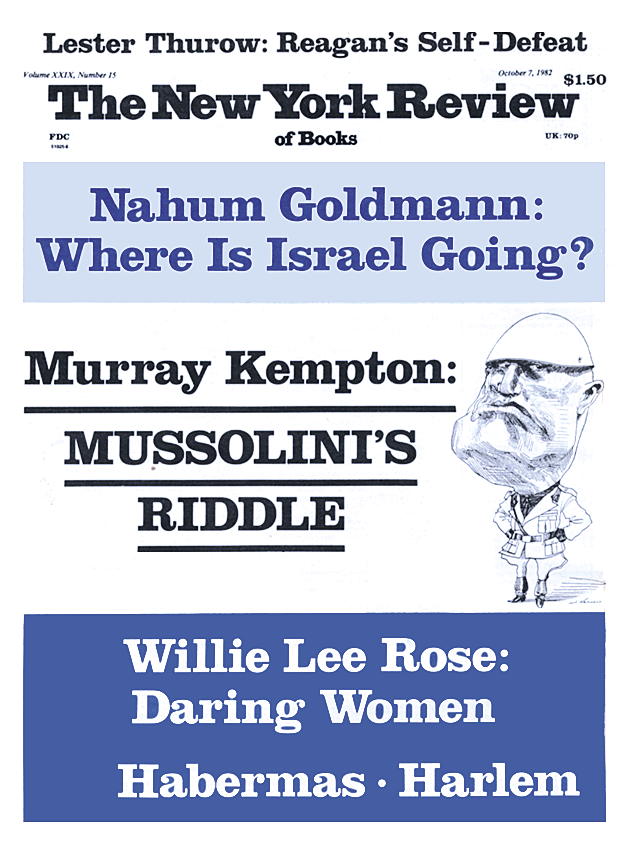In response to:
Mrs. Thatcher's Case from the July 15, 1982 issue
To the Editors:
Lord Annan is entitled, after all those Bloomsbury years, to try his hand at a little populist demogoguery—“intellectuals are often at their worst in interpreting international relations” and “the majority of the country think the government was right to send a task force to the Falklands” (quite so, but so what?), but not to parody by partial quotation [NYR, July 15].
He was kind enough to say that I expressed intellectual outrage at the government’s policy “as well as it could be done” (ouch! though actually lots of people did it better), but then quoted me “If the Argentines want flags and ceremonies, let it be so; all that is unreasonable is if they want to colonise the islands or to govern the islands the way they govern themselves,” and added magisterially “Unfortunately for Crick…Argentine determined from the start to humiliate the British and to make life unendurable for the inhabitants.” One could challenge both his assumption and his fact: Humiliation is no excuse for getting so many killed and risking so much more, and There is no record of any suicides among the islanders during the occupation (no, I know he didn’t mean that, he was only being rhetorical). But I’m more sad that the former historian of ideas (intellectual historian?) ignores the context or misses the point of my New Statesman article, “The Curse of Sovereignty.”
I argued quite simply that the traditional theory of sovereignty does not fit cases like the Falklands, Israel/Palestine and Northern Ireland where, in legal terms, there are two rights but no framework for adjudication. Even factually, indeed, he glosses over that British government speeches stressed sovereignty until the sinking of the Sheffield, only when things threatened to get really nasty from a British point of view was the dangerous (tail-wagging-the-dog) doctrine of self-determination invoked. When sovereignty can neither be, in the long run, enforced nor applied for its traditional purpose (“When the very safety of the State is threatened,” I quoted Machiavelli, “no consideration of good or evil…”), then quite simply political compromise has to follow. Burke said to Lord North concerning the American colonists: “I care not if you have a right to make them miserable, have you not an interest to make them happy.” Annan himself seems to recognise that compromises will now have to be made, that in the long run—whatever the rights or wrongs in legal terms—the situation is untenable. Compromises on both sides, of course, as in Ireland, which may be the rub. But many of who do try (though Annan will now see that I am a highbrow disciple of Arendt) to think, unlike many of the British public being stirred for political purposes quite as flagrant as Galtieri’s were, thought that the compromises might have been made earlier and without the loss of life. “Can honour mend a wound?”, said Falstaff; can sovereignty? Dead theories become hack rhetoric.
Sorry Noel, but some of us do feel very strongly not merely about the lack of proportion in the affair, but the irresponsible diversion of thought, effort and resources from domestic problems. “Irresponsible” by a simple test of political morality: the means did not justify the ends in that we are now in just as bad a position, possibly worse, than before the Argentine invasion.
Bernard Crick
Birkbeck College, University of London
England
Noel Annan replies:
Well, Bernard Crick at any rate is impeccably Bloomsbury—Leonard Woolf would have approved his stand. It would be fine if international politics was governed solely by reason: if sensible trade-offs, flexible sovereignty, and deft compromises were always the order of the day.
Unfortunately it never has been so and never will be; and if evidence for that assertion is required, the most recent is to be found in Kissinger’s memoirs which intellectuals ought to study. It takes two to make a compromise, and I could not see why the wronged party in the dispute was expected to make by far the greater sacrifice.
I don’t take my morals from Falstaff and Shakespeare certainly thought Prince Hal shouldn’t. Honor, like nationalism or patriotism, can be put to evil uses, but it is idle to suggest it can be disregarded, and I would be sorry if it ever were. Mrs. Thatcher needed no prompting or example, but if she had looked for one, she could have observed the fate of President Carter. How far—and it may have been little—it was his fault that the Iranians seized the hostages or Russia Afghanistan, he became associated with what Americans considered to be a national humiliation; and the landslide at the polls, and the cruelly expressed relief which—so it seemed in Britain—Americans felt now that he was no longer presiding over the destinies of their country, showed that politicians should never ignore national sentiment. Even Stalin could not.
A country whose rulers do so will either dismiss them or the country will be treated as of little account by other states in small negotiations as in big.
This Issue
October 7, 1982


